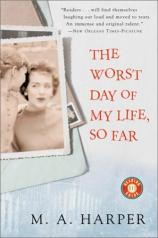Reading Group Guide
Discussion Questions
The Worst Day of My Life, So Far

1. Why do you think this novel was written from a single point of view? Is such close focus on Jeanne effective or claustrophobic? Is it valid for her to relate the experiences and states of mind of other characters-Larry, Rocky, Velma-even though she admits she can't know for sure what they are thinking?
2. How likely is it that the adolescent resentment she felt for her mother in the past colors everything she says about Velma now? Did that resentment stem only from envy? What other things has Jeanne held against her mother? What does she hold against her father?
3. Are Jeanne's ferocious witticisms a weapon against others, or a coping mechanism? Are anyone else's feelings ever hurt by them? How complicit does the reader become, reading her thoughts? Does she ever carry us across that line? What does this say about her mental health?
4. Can Jeanne be as ugly as she feels herself to be? Why is physical beauty such an issue with her? What other kinds of beauty are touched on in this novel, and why are they relevant?
5. Despite the eventual failure of her marriage, is Larry a good match for Jeanne? Is the friendship that springs up between his mother and Jeanne genuine, or does it seem superficial? If her own parents' marriage had not been such a fairytale romance, would Jeanne be a better wife to Larry, or an even less suitable one?
6. What role does their father, C. Ray, play in this family? How accurate can Jeanne's perceptions of him be? Has he left his childhood home and family behind in South Carolina because he wanted to escape them, or rather because he was pursuing something?
7. In how objective a light is C. Ray able to see his daughter Jeanne? How clearly does Velma see her? Does Jeanne genuinely want to be understood?
8. What, besides Jeanne's diary, are symbols of memory in this novel? What significance is there in the repetition of color-Rocky's red cowboy hat, Velma's red lipstick and nail polish, C. Ray's red hair? How does color relate to memory? Are there correlations between the fading of both?
9. When is memory loss presented as a positive thing in Jeanne's narration? What similarities are there between memory loss and forgiveness? Is Jeanne capable of true forgiveness? Do you think she ever forgives the rapist?
10. Jeanne notes that her sister-in-law, Barbara, pursues her own happiness above all else, but has Barbara ever been happy? Who is the happiest character in the novel? Does the author present happiness as something that can be consciously sought and won?
11. Who suffers the most from Velma's Alzheimer's disease during its earliest stages? Does C. Ray recognize it for what it is? Why can't he be more specific with his children about his fears? Is he protecting Rocky's marriage, or is he merely in denial? Does Jeanne attribute to C. Ray the same heroism she'd like to be able to claim for herself? How accurate is the narrative's definition of heroism?
12. How easy is it to empathize with Velma as her disease progresses, given that a later-stage Alzheimer's patient can't communicate? Jeanne tries to make it possible for us to "get inside" her mother's head, but how successful is she? Does she attempt to use any of that empathy in her own dealings with Velma? Is she truly giving the situation all she has, or is she holding something back?
13. Alzheimer's disease frequently touches off explosions of suspicion and resentment among members of the family members. Why hasn't that happened between Jeanne and Rocky? Knowing what we know about them, is their good relationship likely to be maintained after the events of the novel's final chapters, or will it suffer?
14. How does Jeanne's memory of the way she herself was parented influence the raising of her own son, Conrad? It appears to take her longer to understand Conrad than it takes for her to understand anybody else in her life. Is this an inability on her part, or denial? Is Conrad the only person she has failed to understand? What about Velma? Do you think Jeanne has ever really understood her mother, even by the novel's end?
15. When Jeanne says that love isn't always a noun, that sometimes it's really a verb, what does she mean? Jeanne describes herself as cold. Does this mean she's incapable of love in its emotional, "noun" sense?
16. What do you think happens to Jeanne and Velma immediately after the fire? What will happen to them in a week's time? In a month? A year? Does thinking about a likely ending make the beginning of the novel more significant or less so?
The Worst Day of My Life, So Far
- Publication Date: April 26, 2002
- Paperback: 280 pages
- Publisher: Mariner Books
- ISBN-10: 0156007185
- ISBN-13: 9780156007184







